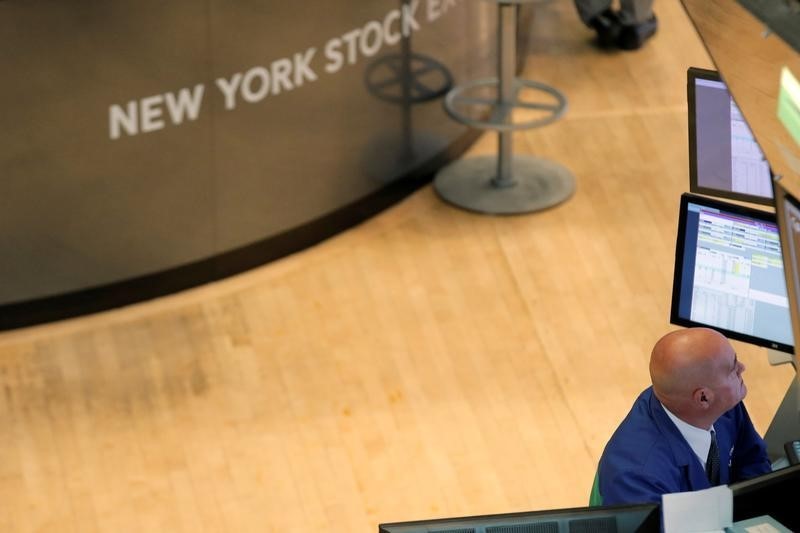Investing.com - Here are the top five things you need to know in financial markets on Tuesday, July 16:
1. Bank earnings in focus, JNJ in the mix
The market's focus is set to remain tuned to bank earnings, after Citigroup (NYSE:C) reported a weak-looking set of underlying numbers that were flattered by a one-off gain.
JPMorgan (NYSE:JPM), Wells Fargo (NYSE:WFC) and Goldman Sachs (NYSE:GS) release earnings before the opening bell.
Johnson & Johnson (NYSE:JNJ) will also report its latest quarterly numbers ahead of the open under the shadow of thousands of lawsuits claiming the company’s talcum powder caused ovarian cancer.
Overall, consensus forecasts are assuming a 3% decline in earnings from S&P 500 companies, according to Factset data.
2. Retail sales, industrial output, Fed speakers on tap
Retail sales and industrial output make up the top-tier U.S. economic data on Tuesday, while speeches from several Federal Reserve members also be scrutinized for insights into the Fed’s thinking on policy ahead of a widely-expected rate cut at the end of the month.
Both data points are forecast to have registered meager growth in June in a marked slowdown from May. Evidence of weakness would make it easier for the Fed to justify a rate cut.
While Fed Governor Michelle Bowman will kick off a "Fed Listens" outreach event at 8:15 AM ET (12:15 GMT) that will include appearances from several policymakers throughout the day, Fed Chairman Jerome Powell will likely steal the spotlight at 1:00 PM (17:00 GMT) at a separate event where he will speak on “Aspects of Monetary Policy in the Post-Crisis Era.”
3. U.S. stocks cautious near record highs
After the S&P ended a day earlier at a record closing high, U.S. futures were little changed ahead of earnings and economic data.
In Europe, individual stock markets were mixed with the pan-European Stoxx 600 trading flat.
London’s FTSE 100 was slightly higher after a solid employment report showed the jobless rate sticking at its lowest level since 1975 and wages, excluding bonuses, rising at the fastest pace in more than a decade. Bank of England Governor Mark Carney may weigh in on the implications of the data for monetary policy at an appearance scheduled for 8:00 AM ET (12:00 GMT).
Germany’s DAX was restrained as a ZEW survey of financial market experts indicated a worse-than-expected deterioration on the current state and outlook for the euro zone’s largest economy.
4. Facebook set to face Capitol Hill
Facebook (NASDAQ:FB) executives will testify in front of the Senate Banking Committee on Tuesday, with the company under pressure to defend its digital coin project Libra.
David Marcus, who heads the Facebook (NASDAQ:FB) division overseeing the project, will tell U.S. lawmakers that it plans to hold off on the launch until regulatory concerns are fully met, according to prepared testimony released on Monday.
U.S. Treasury Secretary Steve Mnuchin on Monday warned that Facebook (NASDAQ:FB) will face much tighter regulatory scrutiny if it ever offers digital financial services, saying that it “must implement the same anti-money laundering safeguards in countering the financing of terrorism as traditional financial institutions."
5. Oil bounces ahead of inventory data
Oil prices bounced, recovering some of Monday’s losses as the Gulf of Mexico put Hurricane Barry behind it, while traders prepare for weekly U.S. inventory data.
Crude declined on Monday after Barry passed without causing major damage, and oil rigs began preparations to restart production. It can however take several days for rigs to get back to full production.
After the market close, the American Petroleum Institute will release its weekly U.S. crude oil stockpiles ahead of the official government data on Wednesday. Expectations are for a decline of 3.38 million barrels.
The Energy Information Administration report will also include data on U.S. production which markets will watch for signs of escalating supply. The EIA’s monthly report released Monday said output from seven major U.S. shale formations is expected to rise to a record 8.55 million barrels per day in August.
The supply situation is also under threat from a number of signatories to the OPEC-led deal on output restraint breaching their commitments. In addition to OPEC members Iraq and Nigeria, non-OPEC Kazakhstan also produced above its agreed ceiling in June.
